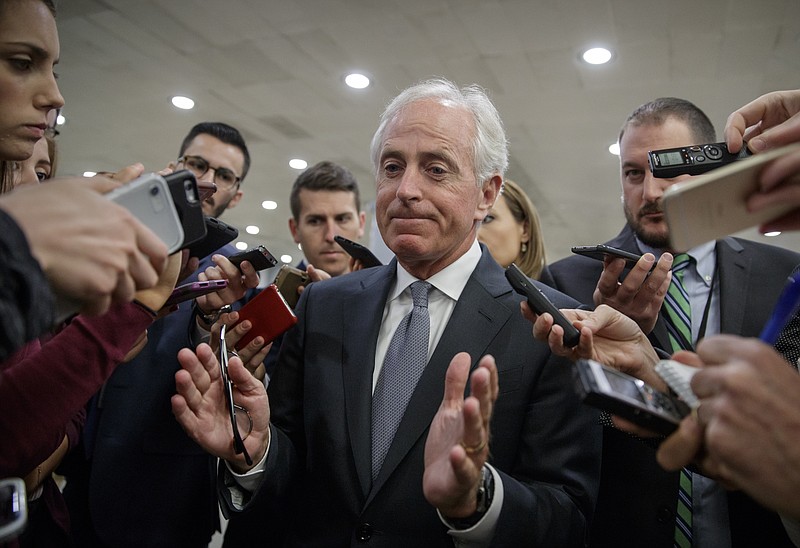Sen. Bob Corker, R-Tenn., made it clear eight weeks ago he was no fan of a tax cut if it increased the deficit.
If "we are adding one penny to the deficit," he told NBC's Chuck Todd on Oct. 1, "I'm not going to be for it. Sorry, it's the greatest threat to our nation."
That was not a sour Corker response due to his late-summer feud with President Donald Trump. That was Corker being Corker in not wanting to increase the deficit. That was Corker being Corker in not wanting to kick the payment can down the road. That was Corker being Corker in being frustrated nothing was being done to cut nondiscretionary spending.
On Tuesday, the state's junior senator was in position to put a giant dent in the president's - and Congress's - desire for a tax cut. But, typical of the former Chattanooga businessman and mayor, he was trying to make things work out.
Corker's reaction
"After agreeing in principle with Senate leadership, members of the finance committee, and the administration on a trigger mechanism to ensure greater fiscal responsibility should economic growth estimates not be realized, I voted today to advance this important piece of legislation. While we are still working to finalize the details, I am encouraged by our discussions."- Sen. Sen. Bob Corker, R-Tenn.
Corker explained that he had spent the weekend and Monday working the phones and meeting with administration officials in an effort to add a mechanism to the tax bill that would generate revenue - in other words, taxes - if the nearly $1.5 trillion bill doesn't produce the kind of economic growth supporters hope it will.
"So, I hope we'll get there," he told CNBC's "Squawk Box" Tuesday. "I know it's important not just to me, but numbers of members who want to make sure that, for some reason these projections are off, we don't have the growth that's been laid out, it doesn't generate revenues, that we're not passing off increased debt to future generations."
When the bill was voted on in the Senate Budget Committee Tuesday afternoon, Corker and another skeptical Republican, Sen. Ron Johnson of Wisconsin, voted to advance it to the Senate floor. But Corker's committee vote is no guarantee of his eventual vote on the bill.
Through it all, he has been consistent on his demand for fiscal soundness.
We believe his concern is well-founded. Individual tax cuts sound great - who couldn't use more of their money, after all? - but they are not worth increasing the long-term burden on those who come after us.
"If we could take the entire individual side of this, throw it in the trash can, and take it directly to the incinerator, I would be thrilled if we were only dealing with the business side as it's turned out," Corker said.
When he said "business side," he meant a corporate tax cut. The United States has one of the world's highest corporate tax rates for developed nations. It's worth cutting that rate not only to lure the business that has left the country for greener pastures - lower tax countries - but also to stimulate job growth and increased wages here.
No neophyte, Corker understands the individual portion of the tax cut proposal is present to help sell the package to the American people. But, he has reiterated, it needs to be revenue-neutral, even given rosy economic projections.
"I'm willing to accept a reasonable score on dynamic growth," he said in October.
To CNBC Tuesday, Corker said he was "willing to swallow" the whole proposal if it didn't increase the deficit. But he made no guarantee he'd vote for it in the end, despite Senate Finance Committee Chairman Orrin Hatch, R-Utah, declaring "we're going to make [bill skeptics] happy."
In truth, we're glad the bill will go to the Senate floor because we want to hear it debated, to learn whether doubling the standard deduction will be canceled by the elimination of certain specific deductions, to know why a tax cut that will expire in a few years can help, to hear if senators are willing to throw away elimination of the Obamacare individual mandate to pass a tax cut, and to understand why lawmakers who decried deficits under former President Obama are OK with them increasing under Trump.
On the other hand, Corker, who has spoken favorably of the need for tax reform and who said going into the Budget Committee vote that a deal had been reached to include his revenue mechanism, hasn't wavered in his stand.
"Everyone was a fiscal hawk - kind of, not really, but kind of - up until the [2016] election," he said in October. "Now it seems like there is a party going on up here; to heck with revenues, to heck with constraining [budgets]."
Republicans understandably want constituents to know that with a president and Congress of the same party that they can pass a major piece of legislation. They need that going into 2018, and Trump needs it.
But the American people deserve it to be fiscally sound, so the slogan Zenith used for many years to sell its products - "The quality goes in before the name goes on" - is relevant here.
Our representatives would do well to remember it.
